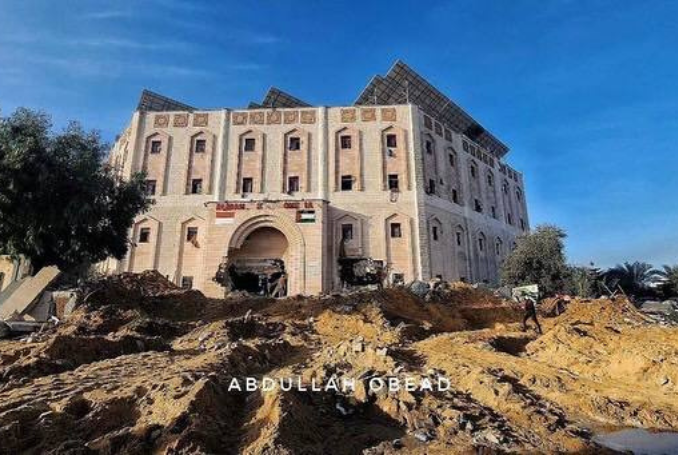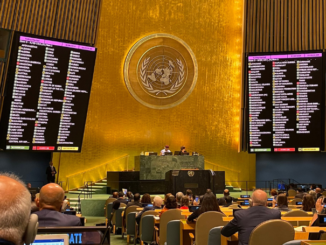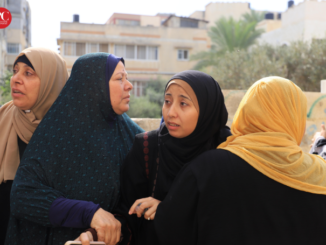
The announcement of the two medical facilities of the potential halt of their medical services is not the first and comes as no surprise.
The Indonesian Hospital and Kamal Adwan Hospital, in the north of the besieged Gaza Strip, are at risk of halting all medical operations due to fuel shortage, according to the official Palestinian News Agency WAFA.
Marwan Sultan, director of the Indonesian hospital revealed that the intensive care unit is overloaded with critical cases in addition to ten other patients who depend on ventilators, WAFA said.
“The Indonesian Hospital is facing a severe fuel shortage, which threatens to completely halt medical services if Israel continues to prevent the entry of fuel, leaving patients at risk of death,” the hospital director was quoted as saying by Anadolu news agency.
Sultan emphasized that although the operating rooms work around the clock, they might be faced with halting all medical services due to fuel shortages.
Indonesian Hospital and Kamal Odwan Hospital in northern parts of #Gaza are facing eminent shutdown due to lack of fuel! pic.twitter.com/gXGupHlJkF
— Motasem A Dalloul (@AbujomaaGaza) September 9, 2024
On its part, the Kamal Adwan Hospital announced in a statement that it will halt all operations within the coming 48 hours due to fuel shortage and exhaustion of medical supplies.
The medical facility warned in its statement that if this happens it will pose a “major threat to the lives of many patients and injured people receiving treatment at the hospital.”
The announcement of the two medical facilities of the potential halt of their medical services is not the first and comes as no surprise since many other hospitals face the same problem due to Israel’s ongoing policy that prevents many basic commodities from entering the Strip including fuel.
Al-Awda Hospital announced on August 17 that it faced a potential halt of its operations in the next twenty-four hours due to a severe shortage of fuel.
In its genocidal war on Gaza, Israel has systematically and relentlessly attacked Gaza’s hospitals, healthcare infrastructure and workers.
The Ministry of Health in Gaza has repeatedly warned against Israel’s obstruction of entry of fuel, medical supplies and equipment on the operation of the remaining hospitals and endangering the lives of patients.
The United Nations Relief and Works Agency (UNRWA) has stressed that the scarce humanitarian aid entering Gaza does not meet the immense needs of Palestinians in the Strip.
This evening, near Kamal Adwan hospital, north of Gaza.
This is the Israeli bloodlust that never gets quenched. This is sadiatic barbarism, official state policy, that the world stands idly by, just watching it unfold.
There has never been worse evil in our lives than Israel. pic.twitter.com/QFXNA451oi
— Jalal #CeasefireNow (@JalalAK_jojo) September 5, 2024
Gaza’s Ongoing Genocide
Flouting a UN Security Council resolution demanding an immediate ceasefire, Israel has faced international condemnation amid its continued brutal offensive on Gaza.
Currently on trial before the International Court of Justice for genocide against Palestinians, Israel has been waging a devastating war on Gaza since October 7.
According to Gaza’s Ministry of Health, 40,988 Palestinians have been killed, and 94,825 wounded in Israel’s ongoing genocide in Gaza starting on October 7.
Moreover, at least 11,000 people are unaccounted for, presumed dead under the rubble of their homes throughout the Strip.
Israel says that 1,200 soldiers and civilians were killed during the Al-Aqsa Flood Operation on October 7. Israeli media published reports suggesting that many Israelis were killed on that day by ‘friendly fire’.
Palestinian and international organizations say that the majority of those killed and wounded are women and children.
The Israeli war has resulted in an acute famine, mostly in northern Gaza, resulting in the death of many Palestinians, mostly children.
The Israeli aggression has also resulted in the forceful displacement of nearly two million people from all over the Gaza Strip, with the vast majority of the displaced forced into the densely crowded southern city of Rafah near the border with Egypt – in what has become Palestine’s largest mass exodus since the 1948 Nakba.
Later in the war, hundreds of thousands of Palestinians began moving from the south to central Gaza in a constant search for safety.
(PC, WAFA)








